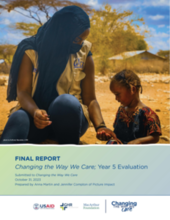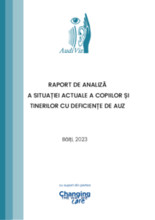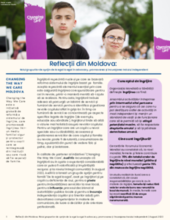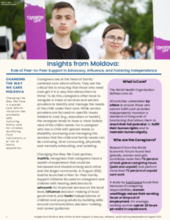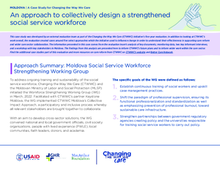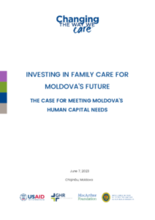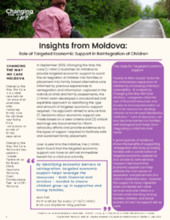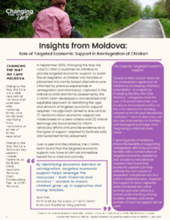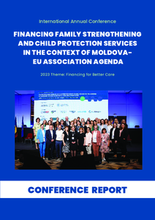This country page features an interactive, icon-based data dashboard providing a national-level overview of the status of children’s care and care reform efforts (a “Country Care Snapshot”), along with a list of resources and organizations in the country.
demographic_data
childrens_living_arrangement
children_living_without_bio
adoption
social_work_force
key_stakeholders
Key Stakeholders
Add New DataOther Relevant Reforms
Add New Datadrivers_of_institutionalisation
Drivers of Institutionaliziation
Add New Datakey_research_and_information
Key Data Sources
Add New DataDevelopment of Integrated Social Care Services for Vulnerable Families and Children at Risk in Moldova
Care Reform Workshop Report
Acknowledgements
Data for this country care snapshot was contributed by partners at Lumos and Changing the Way We Care.
Displaying 41 - 50 of 216
Join this webinar to learn how care reform advocates can use budget analysis, cost estimates and evidence on long-term economic benefits to make the case for investing in a more a child-centered social welfare system.
The Final Report: Changing the Way We Care; Year 5 Evaluation highlights the Changing The Way We Care (CTWWC) initiative’s substantial contributions to advancing care reform globally and in demonstration countries—Guatemala, Kenya, and Moldova—through strengthened policies, systems, and stakeholder collaboration.
În perioada ianuarie - iunie 2023, Asociația de Suport Familial de Recuperare Timpurie a Copiilor cu Deficiențe de Auz și Văz ”AudiViz” a realizat un studiu care a avut scopul de a analiza perceptia parintilor și a copiilor/tinerilor cu dizabilitate de auz privind calitatea vietii lor, a serviciilor oferite de autoritățile publice și dacă acestea răspund nevoilor lor sau contribuie la sprijinirea familiei, la reabilitarea şi integrarea socială, educațională.
În perioada ianuarie - iunie 2023, Asociația de Suport Familial de Recuperare Timpurie a Copiilor cu Deficiențe de Auz și Văz ”AudiViz” a realizat un studiu care a avut scopul de a analiza perceptia parintilor și a copiilor/tinerilor cu dizabilitate de auz privind calitatea vietii lor, a serviciilor oferite de autoritățile publice și dacă acestea răspund nevoilor lor sau contribuie la sprijinirea familiei, la reabilitarea şi integrarea socială, educațională.
Caregivers are at the heart of family-centered care reform efforts. They are the critical link to ensuring that those who need care get it in a way that allows them to thrive. Changing the Way We Care Moldova’s partner, AudiViz, recognizes that caregivers have a wealth of experience that could be harnessed and shared among each other and the larger community.
This case study, part of the five-year evaluation of the Changing the Way We Care (CTWWC) initiative, highlights Moldova’s Social Service Workforce Strengthening Working Group (WG), launched in 2022 by CTWWC and the Ministry of Labor and Social Protection.
The Investing in Family Care for Moldova’s Future presents the case for investing in a more child-centered social welfare system in Moldova and provides specific estimates on the resources needed including an estimate of the resources required to fund the spectrum of programs and services Moldova needs to (i) prevent children from being placed in residential care; (ii) place children in safe, nurturing, and supported families; and (iii) transform residential settings into community assets that effectively meet community needs.
In septembrie 2022, Changing the Way We Care (CTWWC) a lansat o inițiativă pentru a oferi sprijin economic direct în procesul de reintegrare a copiilor în familii sau plasament în servicii de îngrijire de tip familial. În baza experiențelor anterioare de reintegrare, dar și din informațiile extrase din evaluările individuale ale copiilor și familiilor, echipa CTWWC a dezvoltat o abordare standardizată și echitabilă pentru a identifica tipul și valoarea sprijinului economic direct necesar.
In September 2022, Changing the Way We Care (CTWWC) launched an initiative to provide targeted economic support to assist the reintegration of children into families or placement into family based alternative care. Informed by previous experiences in reintegration and information captured in the individual child and family assessments, the CTWWC team developed a standardized and equitable approach to identifying the type and amount of targeted economic support required.
This first International Conference on Financing of Family Strengthening and Child Protection Services in the Context of Moldova’s European Union Association Agenda held in Chisinau from 20-21 June 2023 has been a focused discussion between central and local government, non-governmental, private and academic sectors, international experts and organizations, on ensuring adequate public financing for strengthening families and protecting children, and meeting the challenges associated.

